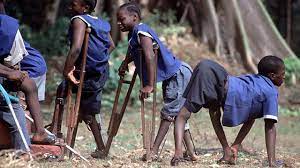By Caleb Jacob
The United Nations International Children’s Fund (UNICEF) has called on the Kano State Government to declare a state of emergency on polio and routine immunisation following the discovery of new cases in the state.
UNICEF revealed that 18 polio cases have been reported across nine Nigerian states this year, with three cases specifically identified in Kano’s Warawa, Bunkure, and Nassarawa Local Government Areas.
Mr. Michael Banda, UNICEF’s Senior Education Manager and Officer-in-Charge of the Kano Field Office, made the call during a media dialogue on Polio and Routine Immunisation held Tuesday in Kano.
Banda urged the state government to release adequate and timely counterpart funding for routine immunisation and upcoming polio vaccination campaigns scheduled for April 24–30, 2025, which coincides with World Immunisation Week.
“This is unacceptable and must be halted,” Banda said regarding the polio resurgence, emphasizing that polio is a highly infectious disease that can cause paralysis and death.
READ ALSO: Polio: UNICEF Unveils Immunization Song To Address Cases Of 2 Million Zero-Dose Children
UNICEF also appealed to local government chairpersons to actively participate in the campaign by launching local flag-off events, supervising vaccination efforts, and joining daily review meetings.
The organization reminded local officials to honor commitments made earlier this year in Kaduna to support immunisation initiatives.
Traditional and religious leaders were called upon to mobilize community support for vaccination, while the media was urged to counter misinformation and encourage widespread participation in the upcoming campaign.
Banda highlighted that immunisation has saved 154 million lives globally over the past 50 years, but warned that low vaccination rates threaten this progress.
READ ALSO: Father Accidentally Kills Son During Fight With Wife
UNICEF stressed that polio outbreaks anywhere pose risks to children everywhere, noting that “Polio knows no boundaries and spreads fast.”
The organization advocated for full implementation of the “One Functional Primary Healthcare Centre Per Ward” policy, arguing that strengthening routine immunisation is key to preventing future outbreaks.
With World Immunisation Week focusing on human papillomavirus (HPV), UNICEF also called on Nigerian authorities to invest in HPV vaccination to protect girls from cervical cancer.
“Vaccines are available, safe, and effective, to realise a future free from vaccine-preventable diseases like polio, cervical cancer, and measles,” Banda concluded.

